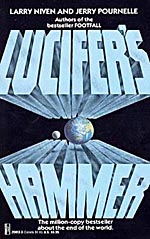
![]() BigEnk
BigEnk
8/15/2025
![]()
The dream team of Niven and Pournelle are back with another thick, broad-scope, end of the world novel. They go back to the basics this time; there are no aliens, space travel, or galactic empires. Lucifer's Hammer is a simple asteroid disaster story, with the narrative split into roughly equal thirds.
The first two hundred pages focuses on our ensemble cast prior to the asteroid hitting earth, as scientists assure the public that it has a near zero chance of coming anywhere close to Earth. Tensions rise as that number climbs over the weeks, with a lot of characters running for the hills, but a solid majority sticking to their nine-to-five grinds until the very end. The second portion is the shortest, detailing how each of characters survives (or dies) during the ensuring apocalypse scenario. The final third follows two large communities that coalesce in the weeks after the disaster, seeking to find high ground above the inland lakes that is both defensible and low enough to avoid the coming brutal winters of the imminent ice age.
Unfortunately, Lucifer's Hammer is not dreamy at all. This is my least favorite of their shared works, in no small part because what they do best is missing completely: aliens. Both Footfall and The Mote In God's Eye are highlighted and buoyed by creative, well-developed alien species. Here we're stuck in the human realm, a place where Niven and Pournelle often become mired in their own decrepit viewpoints. And lets talk about those characters for a moment, because there are an egregious amount of them. There are simply too many to develop effectively, and I often found myself confused (especially toward the end) trying to keep track of them all. This confusion is worsened by some unforced errors in naming, with some primary characters named Harvey, Harry, and (Al) Hardy.
We spend the first several hundred pages getting to know these characters, but end up with not much to show for it, making for an opening that is both dull and gratuitous with detail. I've read enough bourbon-swilling and lustful adultery from these two, thanks. The middle portion during the disaster itself is probably the best, though the mass of characters gets in the way because the dream team insists we see every moment through every group’s eyes, meaning that what should be exciting and momentous grows tedious after it’s repeated for the tenth time. I will say that one of the strengths of Lucifer's Hammer is it's ability to show how quickly things can go bad, and by "bad" I mean grotesquely horrific. This book is not afraid of detailing the morbid realities of an apocalypse.
In my reading, the main thematic viewpoint is a borderline deification of science and technology. In N&P's minds, modern society takes for granted so many luxuries that function as the crux between where we are now, and a feudal peasant society that includes human sacrifices for sun gods. They have a decisively pessimistic view on innate human nature, seeing humans as scared sheep, quick to revert to safety and close mindedness when faced with challenges beyond their comprehension. It's also full of their classic soapboxing about conservative complaints from the era, including: NASA not getting enough funding, Ralph Nader's consumer protection policies, hippie communes, environmentalism, anti-nuclear power policies, you name it. This drags the entire book down even further. It's reactionary, silly, and obtuse. Most of these points get hit hardest in the final third of the novel, which left me with a horrid taste in my mouth.
The post-Hammerfall world is divided into the civilized valley, run by a senator, who works mainly within the framework of necessary socialism (though there is the required griping about how they can't wait to get back to some form of capitalism). The one black person in this community, a former astronaut, literally says that he's "seen enough equality" in his lifetime. They happily take up slavery as a necessary evil as they pat themselves on the back for leading society towards technological advancement. Then there's the seething mass of Luddite, religious, ethnic, militarized, and communistic cannibals who spread through communities and absorb them through violence and acceptance of their cannibalistic rituals. It started to feel like a satire at points, though I'm sure that it wasn't intended to be, knowing their real life politics.
What else is there to say? This is basically all of the bad from the dream team without much of the good. I didn't enjoy Seveneves, but it does this disaster plot much better. Hell, even Niven and Pournelle did it better a few years later with Footfall, which I discovered was the book they initially wanted to write, at least until the publisher told them to nix the alien part of the plot. Thankfully they were able to correct that error, but sadly I am unable to correct the error of reading all six hundred pages of this.